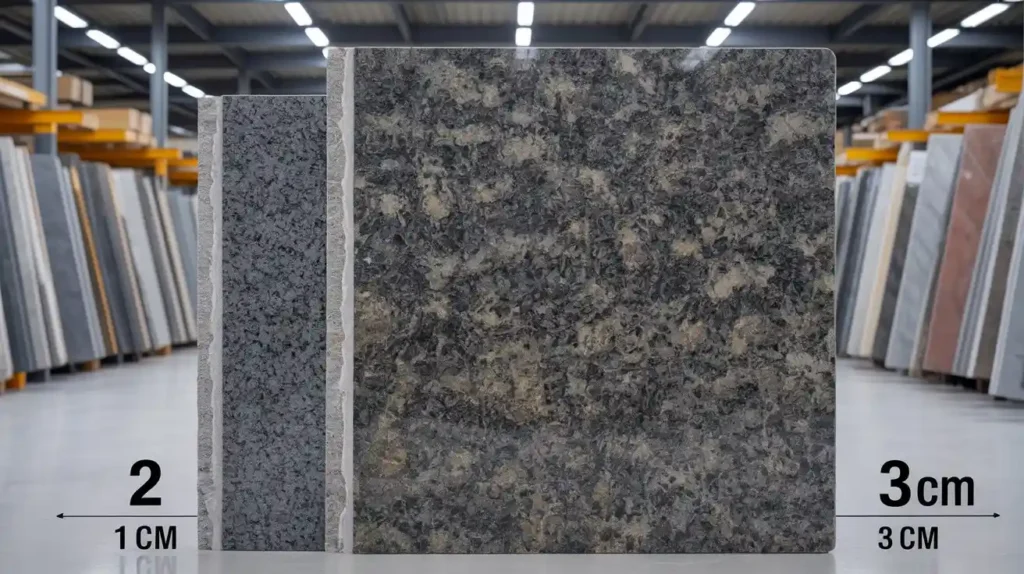When planning a kitchen remodel, one of the first practical questions homeowners ask is: How Heavy Are Granite Countertops? This question matters because weight affects cabinet strength, safe installation, transportation, and long-term durability. Granite is widely known for its natural beauty and strength, but many homeowners still ask, is granite heavy and whether their existing cabinets can support it.
Understanding the granite weight per square foot helps prevent structural issues and unexpected costs. In this guide, we will explain real numbers, practical examples, and what you need to know before installing granite countertops in your home.
How Heavy Are Granite Countertops?
Granite is a natural stone formed under intense heat and pressure. Because of its density, it is heavier than most countertop materials. At SF Marble & Granite Inc , we help homeowners understand the granite weight per square foot so they can plan their kitchen project properly and avoid structural or installation surprises.
Average Weight Per Square Foot The weight of granite per cubic foot is typically around 165–175 pounds. From that, we calculate surface weight based on thickness.
2 cm (¾ inch) Granite Weight
Approx. 12–13 pounds per square foot Common in bathrooms and vertical applications Often requires plywood support underneath
3 cm (1¼ inch) Granite Weight
Approx. 18–20 pounds per square foot Most common for kitchens Usually installed without plywood
So if you’re asking, how much does granite weigh per square foot, the answer depends on thickness. But on average, expect between 13 and 20 lbs per square foot.
That’s why many homeowners ask again: Is granite heavy? Yes, but it is manageable when installed correctly.
Total Weight of a Full Granite Slab A standard granite slab measures roughly:
9 to 10 feet long 5 to 6 feet wide 2 cm or 3 cm thick
A full 3 cm slab can weigh 700–1,000 pounds.
That number often surprises people who ask, how heavy is granite compared to other materials? The answer: significantly heavier than laminate or solid surface.
Example Weight Calculation
Let’s say you have 50 square feet of countertop space:
50 sq ft × 18 lbs (3 cm granite) = 900 pounds total
This gives you a clear idea of the overall kitchen weight.
Granite Countertop Weight by Kitchen Size To make it easier, here are common kitchen examples.
Small Kitchen (30 sq ft)
3 cm granite: ~540 pounds
Medium Kitchen (50 sq ft)
3 cm granite: ~900 pounds
Large Kitchen with Island (70 sq ft)
3 cm granite: ~1,260 pounds
When homeowners hear these numbers, they often ask again: Is granite heavy for cabinets? In most cases, standard kitchen cabinets are built to support this load.
Factors That Affect Granite Countertop Weight Not every project weighs the same. Several elements influence final weight.
Slab Thickness (2 cm vs 3 cm) Thickness is the biggest factor.
2 cm granite weighs less but needs support. 3 cm granite weighs more but is structurally stronger.
Most kitchens use 3 cm because it balances durability and stability.
Countertop Size and Layout More surface area means more total weight. L-shaped kitchens, U-shaped kitchens, and islands increase weight quickly.
Edge Profiles and Custom Fabrication Thicker edges, laminated edges, and decorative profiles add material. Custom fabrication slightly increases total weight.
Cutouts for Sink and Cooktop Cutouts actually reduce weight slightly. However, they create stress points that require reinforcement during installation.
Granite vs Other Countertop Materials (Weight Comparison) Understanding comparisons helps homeowners make informed choices.
Granite vs Quartz Quartz has a similar density. In fact, quartz typically weighs:
18–23 pounds per square foot (3 cm)
So, when asking how heavy is granite compared to quartz? The difference is minimal.
Granite vs Marble Marble’s weight per square foot is very close to granite’s. Both are natural stone and dense materials.
Granite vs Laminate Here’s where weight changes significantly.
Laminate countertop weight per square foot is only:
2–4 pounds per square foot
That is much lighter than granite.
So if you compare the laminate countertop weight per square foot with granite, the laminate is dramatically lighter. But laminate lacks the durability and lifespan of natural stone.
This is often when homeowners understand why granite feels solid and long-lasting.
Do Granite Countertops Require Extra Support? The short answer: usually no if cabinets are properly built and level.
Cabinet Strength Requirements Standard modern kitchen cabinets are designed to hold granite weight.
If cabinets are:
Securely anchored Level Structurally sound
They can support typical granite loads without issues.
Support for Overhangs and Islands Overhangs over 10–12 inches need support brackets.
Examples:
Breakfast bars Large islands Seating areas
Without support, weight distribution can cause stress cracks.
Brackets and Reinforcement Options Common support solutions include:
Steel countertop brackets Hidden island supports Corbels Reinforcement rods
Before installation, cabinets are carefully assessed to ensure they are level, secure, and strong enough to support the weight of granite, helping prevent structural problems later.
How Granite Weight Impacts Installation Weight directly affects installation planning.
Professional Installation Requirements Because a single slab can weigh hundreds of pounds, granite installation requires:
Multiple trained installers Proper lifting tools Safe handling techniques
DIY installation is not recommended.
If you are planning a remodel and need expert help, consider professional Countertop Installation Lowell, MA services to ensure proper structural support and safe installation.
Transportation and Handling Granite must be transported vertically on A-frames. Improper handling can cause cracks before installation.
Structural Considerations for Remodels If installing granite in older homes:
Check the cabinet condition Confirm floor stability Inspect wall anchoring
These steps ensure the structure supports the full granite load safely.
You may also read: How to Treat Granite Countertops
Why Granite Countertops Are Worth the Weight Yes, granite is heavy. But weight is part of its value.
Strength and Durability Granite resists:
Scratches Heat Daily wear
Its density gives it strength.
Long-Term Value Granite can last decades with proper sealing. Many homeowners view it as a permanent upgrade.
Natural Beauty Each slab is unique. Patterns and veining cannot be replicated exactly.
This combination of strength and beauty explains why granite remains one of the most trusted natural stones in kitchens.
Why Choose Us for Granite Countertops in Lowell, MA When dealing with heavy natural stone, experience matters.
At SF Marble & Granite Inc, we focus on:
Expert granite fabrication Careful weight calculations Strong cabinet assessments Safe and precise installation 10+ years of hands-on experience
We understand exactly how much granite weighs per square foot and how to distribute that load safely across cabinets.
Granite is heavy, but when installed correctly, it performs beautifully for decades.
Final Thoughts So, How Heavy Are Granite Countertops? They are heavy, typically 13–20 pounds per square foot, and a full kitchen can weigh close to 1,000 pounds or more. But weight alone should not discourage you.
Granite’s density is what makes it strong, durable, and long-lasting. When cabinets are properly installed and the project is handled by professionals, granite performs safely for decades.
If you’re planning a kitchen upgrade and want expert guidance, contact SF Marble & Granite Inc today. Our team will evaluate your space, calculate accurate granite weight per square foot, and ensure safe installation from start to finish.
Granite may be heavy, but when installed correctly, it’s one of the most reliable investments you can make in your home.
FAQs How much does a 10-foot granite countertop weigh?
A 10-foot section at 3 cm thickness can weigh between 180 and 250 pounds, depending on width. Granite weight per square foot averages 18–20 pounds, so size directly affects total load.
Is a 3 cm granite too heavy for standard cabinets?
No. Most modern cabinets are built to support granite weight. As long as cabinets are level and securely installed, 3 cm granite is safe.
Do upper floors need reinforcement?
In most residential homes, additional reinforcement is not required. The weight of granite per cubic foot is high, but distributed across cabinets, it remains within structural limits.
Can old cabinets support granite?
It depends on their condition. Weak, damaged, or poorly anchored cabinets may need reinforcement before granite installation.
How heavy is granite compared to laminate?
Granite is much heavier. Laminate countertop weight per square foot is only 2–4 pounds, while granite averages 13–20 pounds, depending on thickness.








